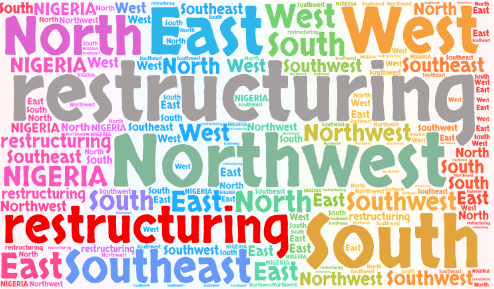What Restructuring Means
BENJAMIN OBIAJULU ADUBA

In an interactive session with Nigerians in France, President Muhammadu Buhari was quoted as follows:
Buhari had said, “There are too many people talking lazily about restructuring in Nigeria. Unfortunately, people are not asking them individually what do they mean by restructuring? What form do they want restructuring to take? “Do they want us to have something like the three regions we used to have? And now we have 36 states and the FCT. What form do they want?” They are just talking loosely about restructuring. Let them define it and then we see how we can peacefully do it in the interest of Nigerians.
It is an encouraging sign that the president wants to understand what restructuring means and is willing to see how it would be implemented peacefully.
Restructuring means first and foremost to align Nigerian so that all voices are heard; so that all voices have equal weight, and so that all men and women are created and treated equally.
This is not the case under the present structure. For example why will Lagos State, population 20 million (Est) have 20 local governments while Kano State, population 20 million (Est) have 44 Local governments? The voice of each Kano resident is twice louder than that of a Lagosian. SE residents have 15 members in the senate while NW has 21. Again the volume of sound of a North Westerner is much louder than that of a South Easterner. The implication of these two factors means that resources are not equitably allocated to all Nigerians or Nigerian states. For example when we allocate resources to local government, Lagos gets a mere half of what Kano gets even though the two state have comparable population.
One of the allocation methods is based on number of square miles of a state. Nigeria is the only country where this formula is in place. Resources are for people not land. Whose idea was this in the first place?
Restructuring also means that we create regions, zones, whatever the name is, such that political power is brought nearer to the people, and that zones engage in spirited but peaceful competition one with another. When Chief Awolowo introduced free primary education to the then Western Nigeria, Eastern Nigeria followed almost immediately. In the same vein marketing boards were created in each region depending on the products obtainable from the region: groundnut, palm oil, cocoa, etc. Each Marketing Board tried to outdo the other and developments grew in each region. These things happened because each region had the power and size to get it done. If the zones/regions are again empowered the results would be the same.
The empowerment of the zones implies that the resources derived from the zone are used to develop the zone and each zone tries to generate as much internally derived revenue as possible. Under the current arrangement most states run to Abuja for such things as the salaries of state workers. This is unsustainable. Each zone should be roughly independent for whoever pays the piper has earned the right to call the tunes which is what the Nigerian Federal Government does now.
What else does restructuring mean? It also means that power will be taken from the center and given to the regions/zones. The cost of running the FG will be derived from the taxes paid by each zone. An example could be 10% of minerals derived from each zone or a monetary charge say N10 billion charges on each zone. The role of the FG would be very limited to common interests such as national defense, Foreign Affairs and inter-regional transportation. It will lessen the “do or die” politics for the presidency. It would also make such satanic and idiotic ideas as “the Python Dance” difficult to implement.
This essay is not meant to be the last word on restructuring but a mere guide. A national committee/conference like the one under Jonathan could find and define more fully what restructuring means.
Benjamin Obiajulu Aduba writes from Boston, Massachusetts









